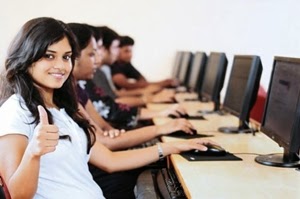1. System software is the set of programs that enables your
computer’s hardware devices and _______ software to work together.
(a) Management
(b) Processing
(c) Utility
(b) Processing
(c) Utility
(d) Application
(e) None of these
(e) None of these
2. _______ are specially designed computer chips that reside
inside other devices, such as your car or your electronic thermostat.
inside other devices, such as your car or your electronic thermostat.
(a) Servers
(b) Embedded computers
(b) Embedded computers
(c) Robotic computers
(d) Mainframes
(d) Mainframes
(e) None of these
3. SMPT, FTP and DNS are applications of the _______ layer.
(a) data link
(b) network
(c) transport
(b) network
(c) transport
(d) application
(e) None of these
(e) None of these
4. According to which of the following, in a database,
should information be organised and accessed?
should information be organised and accessed?
(a) Physical position
(b) Logical structure
(b) Logical structure
(c) Data dictionary
(d) Physical structure
(d) Physical structure
(e) None of these
5. WORM stands for _______.
(a) Wanted One Read Memory
(b) Write Once Read Many
(b) Write Once Read Many
(c) Write Original Read Many
(d) All the above
(d) All the above
(e) None of these
6. Which of the following is separate software layer that
acts as ‘glue’ between the client and the server parts of an application and
provides a programming abstraction?
acts as ‘glue’ between the client and the server parts of an application and
provides a programming abstraction?
(a) Freeware
(b) Firmware
(b) Firmware
(c) Shareware
(d) User-supported software
(d) User-supported software
(e) Middleware
7. Which of the following is a must for a computer?
(a) Chip
(b) Data
(c) Mouse
(b) Data
(c) Mouse
(d) Processor
(e) None of these
(e) None of these
8. Disk can be used to store _______.
(a) Random files
(b) Sequential files
(b) Sequential files
(c) Both (a) and (b)
(d) Horizontal files
(d) Horizontal files
(e) None of these
9. A derived class may also be called as _______.
(a) sub-class
(b) super class
(b) super class
(c) parent class
(d) deprived class
(d) deprived class
(e) None of these
10. The capacity of program counter is _______.
(a) 8 bits
(b) 14 bits
(c) 16 bits
(b) 14 bits
(c) 16 bits
(d) 12 bits
(e) 32 bits
(e) 32 bits
11. In _______ generation computer the speed was measured in
nanoseconds.
nanoseconds.
(a) first
(b) second
(c) third
(b) second
(c) third
(d) fourth
(e) fifth
(e) fifth
12. The process of transferring of files from your computer
to the computer on the internet is called _______.
to the computer on the internet is called _______.
(a) downloading
(b) uploading
(c) FTP
(b) uploading
(c) FTP
(d) sharing
(e) downsizing
(e) downsizing
13. Timing and control unit is a part of a(n) _______.
(a) ALU
(b) Processor
(c) Memory
(b) Processor
(c) Memory
(d) CMOS
(e) BIOS
(e) BIOS
14. Chip is the common name for a(n) _______.
(a) transistor
(b) resistor
(b) resistor
(c) integrated circuit
(d) semiconductor
(d) semiconductor
(e) None of these
15. _______ is developed specifically for a distinct
industry.
industry.
(a) Personal productivity software
(b) Application software
(b) Application software
(c) Decision support system
(d) Vertical market software
(d) Vertical market software
(e) System software
16. Which of the following services is not provided by
Internet service provider?
Internet service provider?
(a) Internet transit
(b) Domain name registration
(b) Domain name registration
(c) Hosting
(d) Dial-up access
(d) Dial-up access
(e) None
17. A source program is written in a _______ language.
(a) high-level
(b) low-level
(c) binary
(d) All the above
(e) None of these
18. The transfer rate of a standard USB 2.0 Device is _______.
(a) 100 M bit/s
(b) 250 M bit/s
(b) 250 M bit/s
(c) 480 M bit/s
(d) 500 M bit/s
(d) 500 M bit/s
(e) 1 G bit/s
19. The control part of a disk is known as
(a) surface
(b) hub
(c) cylinder
(b) hub
(c) cylinder
(d) cluster
(e) None of these
(e) None of these
20. Which of the following languages is used for process
control?
control?
(a) ADA
(b) COBOL
(c) BASIC
(b) COBOL
(c) BASIC
(d) PASCAL
(e) LISP
(e) LISP
Important For: SBI ASSOCIATES CLERK, NICL Assistant
NOTE: If you find any errors in the answers, please correct. Typing Error May Occur Anytime.



